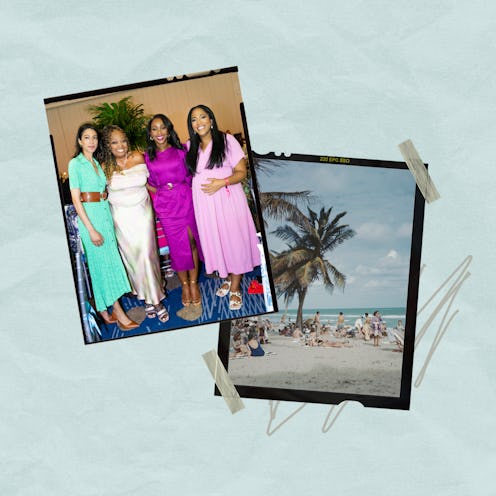Rule Breakers
I’ll Be Using These Lessons From ColorComm 2023 For Years To Come
When Bustle Digital Group’s SVP of fashion headed to a Miami conference designed for women of color, what she found surprised her.

There aren’t many places where women can come together to truly champion diversity and empowerment, which is why when I was asked to moderate a panel at the ColorComm Conference in Miami, I jumped at the opportunity. The spirit of the three-day event, which brings together women of color working in communications fields, was one of joy and excitement. Between sessions, attendees rushed from one panel to the next, taking notes and sharing ideas as they went. Although I’ve been in my industry for quite some time, I’m a strong believer that there’s always more to learn from innovative people, both those in and out of my field.
“Reconnecting after four years of being away due to the pandemic allowed attendees to reimagine their journeys at work and reimagine what success looks like to them in a new way of life,” said ColorComm’s founder and CEO, Lauren Wesley Wilson, in a statement during the week.
By the end of the conference, my notepad was filled with variations on this idea. Below, my four key takeaways from the week.
1Women are overwhelmingly stressed out.
During my panel, which addressed mental health and wellbeing, I spoke with theSkimm’s co-founders and co-CEOs, Carly Zakin and Danielle Weisberg. They emphasized the importance of using your network to lighten your load and responsibilities, as opposed to trying to do everything. They pointed to theSkimm’s recent State of Women report, conducted with The Harris Poll, which found that 71% of women feel that it’s their job to worry. The top five words millennial women used to describe their mental state were stress, anxiety, exhaustion, depression, and confusion.
Zakin and Weisberg strongly advocated for creating and using a network of women who’ll work together and help each other in times of need.
2Perfect people are not real, and real people are not perfect.
In a panel on motherhood in the workplace, Shelley Zalis, the CEO of the Female Quotient, spoke with Grace Bastidas, the editor-in-chief of Parents magazine, about the idea of raising children as a shared experience — like the age-old saying “It takes a village to raise a child.” They also emphasized that parenting is about getting a job done, rather than doing it from a place of perfection. It’s impossible to be a “perfect” parent, so it’s important to do it to the best of your ability. It’s OK to be a bad mom sometimes.
Regardless if you have children, or are planning to, the idea holds: The inability to be perfect is something many women grapple with.
3It’s crucial for Black women to prioritize financial literacy.
In a conversation around Black women in the workplace three JPMorgan Chase & Co. leaders, Racquel Oden, Michele Lawrence, and Cassandra Cyrius, spoke about the importance of financial literacy, particularly regarding investments for retirement. Even though Black women are a larger part of the workforce and more likely to be family breadwinners than women from other racial backgrounds, there’s still some embarrassment when speaking about financial literacy in Black communities. And since women statistically live longer than men, Black women in particular will likely be managing their household finances, but are generally not equipped with the knowledge needed to do so.
When it comes to investments and generational wealth, women tend to take less risk in investing, which can often lead to less reward. While it’s important not to spend everything you have, Oden and Lawrence encouraged attendees to invest in a diversified portfolio and in brands you believe in and interact with in daily life — making sure that your money is working beyond your regular paycheck.
4“[It] does not matter what everyone [else] is saying… Do you.”
In one of my favorite conversations, artists from different backgrounds celebrated how Black culture has shaped pop culture while simultaneously affecting the media landscape. Hip-hop as a genre turned 50 years old, having started as a youth-led subculture. The people who’ve guided it through different transitions are now considered historical legends in music, art, and fashion. It’s helped people express emotion, and dig into politics and psychology, all while encouraging the art of self-expression.
Artist Yo-Yo spoke about experiencing misogyny in the music and hip-hop industries, explaining that she began writing music because she wanted to write for women and combat the derogatory language she was hearing in lyrics. Whether you’re in creative industries or not, her advice rings true: “[It] does not matter what everyone [else] is saying… Do you.”